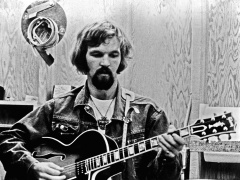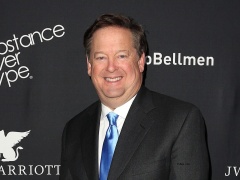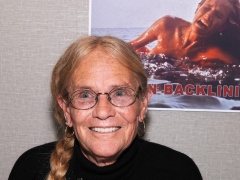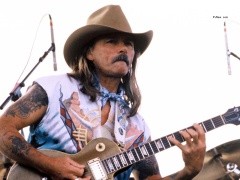
William Hurt, who became a top leading man in the 1980s, winning an Oscar for 1985’s “Kiss of the Spider Woman” and starring in “The Big Chill” and “Body Heat,” died Sunday of natural causes. He was 71. Hurt’s death was confirmed to PvNew by his friend, Gerry Byrne.
His son Will said in a statement,“It is with great sadness that the Hurt family mourns the passing of William Hurt, beloved father and Oscar winning actor, on March 13, 2022, one week before his 72nd birthday. He died peacefully, among family, of natural causes.”
Hurt was nominated for four Oscars over the course of his long career, scoring two best actor nominations for “Broadcast News” and “Children of a Lesser God” and a supporting actor nod for less than 10 minutes of screen time in “A History of Violence.” He was one of the most heralded performers of the 1980s, becoming something of a cerebral sex symbol and a reluctant, albeit bankable, movie star. Hurt later transitioned into character roles in the 1990s and successfully alternated between big screen projects and television, scoring Emmy nominations for his work as a whistleblower in “Damages” and his portrayal of Treasury Secretary Henry Paulson in “Too Big to Fail.”
More recently, Hurt became well known to a younger generation of movie lovers with his portrayal of the no-nonsense General Thaddeus Ross in 2008’s “The Incredible Hulk.” He later reprised the role in “Captain America: Civil War” and “Avengers: Infinity War,” “Avengers: Endgame” and “Black Widow.”
Hurt was born March 20, 1950 in Washington, D.C. His mother, Claire Isabel, worked at Time Inc., and his father Alfred Hurt (1910–1996), was a career bureaucrat, working for the United States Agency for International Development and the State Department. His parents separated when he was 6 years old, and his mother remarried Henry Luce III, the son of Time Magazine publisher Henry Luce.
Raised in relative privilege, Hurt went on to attend Tufts University, where he studied theology, before moving to Juilliard to study acting. After appearing on stage, Hurt secured a lead role in “Altered States,” playing a troubled scientist in Ken Russell’s offbeat film, a notable entry in the body horror genre. But a year later, Hurt achieved a new level of prominence, appearing opposite Kathleen Turner in “Body Heat,” a steamy noir that updated the kind of treachery and double-crossing seen in the likes of “The Big Sleep” and “Double Indemnity” with a bracing sexuality. It transformed both performers, who positively ignited on screen, into major stars. Hurt followed that with another lead role in “Gorky Park” and was part of the ensemble of “The Big Chill,” a drama about a group of friends reuniting that became a touchstone for the baby boomer generation.
That was all a lead up to one of the most stunning periods of dominance ever enjoyed by a movie star. From 1986 to 1988, Hurt was nominated for three consecutive best actor Oscars, winning for his portrayal of a gay window dresser in Hector Babenco’s “The Kiss of the Spider Woman.” Roger Ebert, writing in the Chicago Sun Times, praised Hurt’s work, crediting him with creating “…a character utterly unlike anyone else he has ever played — a frankly theatrical character, exaggerated and mannered — and yet he never seems to be reaching for effects.” His Oscar-nominated work in “Children of a Lesser God” and “Broadcast News,” playing a teacher at a school for the deaf and an affable, slightly dim-witted newsman, showcased his range. The commercial and critical success of those films rocketed Hurt to the A-list, but he didn’t seem to relish the celebrity.
“It’s not right that my privacy is invaded to the extent that it is,” Hurt told the New York Times during a 1989 interview. “I’m a very private man, and I have the right to be. I never said that because I was an actor you can have my privacy, you can steal my soul. You can’t.”
Perhaps it was that aversion to notoriety that led Hurt to turn down some major movies over the course of his career, with the actor passing on opportunities to star in the likes of “Jurassic Park” and “Misery.” His time in the spotlight also coincided with a period of personal trouble for the actor, one in which he struggled with drugs and alcohol.
“I was utterly miserable and, finally, I had been miserable enough, long enough, and I said, ‘I’m finished, I can’t hack it, can’t do it,'” Hurt told the Washington Post in 1989, remembering the time before he went to rehab.
A relationship with Marlee Matlin, his co-star in “Children of a Lesser God,” was troubled. Matlin later wrote in a memoir that Hurt was emotionally and physically abusive to her. In a statement at the time, Hurt, through a spokesperson, said: “My own recollection is that we both apologized and both did a great deal to heal our lives. Of course, I did and do apologize for any pain I caused. And I know we have both grown. I wish Marlee and her family nothing but good.”
The 1990s proved to be a less fruitful time for Hurt professionally. He earned raves for his work in “The Doctor” as an arrogant surgeon who undergoes a change-of-heart after experiencing health struggles, but other films such as “Second Chances” and “Until the End of the World” failed to generate much attention. A rare attempt at popcorn entertainment with 1998’s big-screen adaptation of “Lost in Space” was a modest hit, but didn’t earn enough money to spawn a franchise and Hurt looked miserable throughout the movie.
He also appeared in the TV mini-series version of “Dune,” in Steven Spielberg’s “A.I. Artificial Intelligence” and in M. Night Shyamalan’s “The Village.”
As the aughts dawned, Hurt, his blonde hair thinning, seemed to settle into life in supporting roles, scoring scenery stealing turns as an urbane spy in “The Good Shepherd,” a demanding father in “Into the Wild,” and, most memorably, as a sinister mob boss in “A History of Violence.” His role in the latter film, in which he admits to his hit man brother that “when mom brought you home from the hospital, I tried to strangle you in your crib,” was a master class is doing a lot with a little bit of screen time.
Hurt was married to the actress Mary Beth Hurt from 1971 to 1982 and was married to Heidi Henderson from 1989 to 1991.






